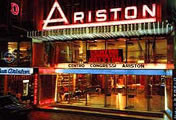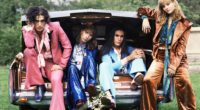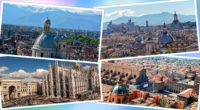
The 59th Festival della Canzone Italiana, otherwise known as Sanremo, begins on Tuesday 17th February in the Teatro Ariston in the Ligurian town. All through the week EuroVisionary will bring you up to date with the latest news.
For one week, attention will be focused on the small town on the Italian Riviera, as established artists and those hoping for a breakthrough, compete to join the illustrious list of festival winners.
The Newcomers section, known as the Proposte gives young singers the opportunity to reach a wide audience and has been the launch pad for many a successful career. Past winners include Eros Ramazotti, Laura Pausini and Andrea Bocelli, three of the most popular singers in the world.
The section for established artists, usually known as Campioni, but this year known simply as Artisti, still maintains a respect and prestige among the Italian public and music industry. Among the famous names this year are Al Bano, Iva Zanicchi and Fausto Leali.
The week rarely passes by without some kind of controversy or other incident to temporarily divert attention away from the music. In 1993, someone tried to throw himself off the balcony in the auditorium, and was talked down by host Pippo Baudo. Cynics said it was a publicity stunt. There was also a near riot in the theatre, also in 1993, when crowd favourite Renato Zero was announced as finishing in fifth place. Jeering and booing continued, clearly upsetting Rossana Casale & Grazia Di Michele, who had finished in third place. Pippo had to stop proceedings and appeal to the crowd to calm down, before he could announce the second and first places. When blind singer, Annalisa Minetti, won in 1998, one journalist, speaking on the post festival programme, Dopo Festival, suggested she had only won because she was blind, and he didn’t stop there. He went on to query if she would enter the festival the following year and claim to be deaf so that she could win again.
The festival has also seen many memorable and highly emotional performances, 1996 provided good examples of both. Elio e le Storie Tese is a band whose songs are what might be described as different. Not content with their song, La Tera dei Cacchi being completely different to the rest of the songs in the festival, they chose to wear silver space suits and silver body paint for their performance on the last evening of the festival. It was very funny, but ultimately may have cost them victory. Al Bano’s song, E la Mia Vita, was about his missing daughter. He put so much into his performance that he collapsed on to one knee at the end. Massimo Ranieri gave singers everywhere a lesson in performance in 1995, when he completely lived the words and emotions of La Vestaglia.
Songwriters have never been afraid of any subject matter. Themes include domestic abuse (Milva – Sono Felice – 1990), Rape (Luca Barbarosa – L’amore Rubato – 1988) and Capital Punishment (Enrico Ruggeri/Andrea Miró – Nessuno Tocchi Caino – 2003) being just three examples of the difficult and emotional subjects covered.
This year’s festival has a knockout system for I Artisti. On the first evening, all the songs in this section will be performed. The ‘giuria demoscopica’ will vote for the 13 songs who will perform again on the second evening. On the second evening, these 13 songs will perform again and the top ten will qualify automatically for the fourth evening on Friday. On Thursday (the third evening) the bottom three from Wednesday will compete with the three songs eliminated on the first evening for the right to go through to fourth evening on Friday. On Friday evening, all the Artisti will sing their songs again in duets with famous singers. More votes will be cast to decide the ten songs who will compete in the Ultima Serata on Saturday. Friday will also see the winner of the Proposte section announced. On Saturday, the top ten Artisti will perform to win the votes of the ‘giuria demoscopica’ and the public. By the end of the evening. The winner of the 59th Sanremo festival will be known.
Eurovisionary will bring you daily updates from the festival. In the meantime, you can watch last year’s winners below. The first video is the winner of the Proposte, Sonohra with L’amore. The second video is the winner of the Campioni section, Giò Di Tonno e Lola Ponce singing Colpo di Fulmine.
Here is the full list of participants.
Artisti
Afterhours – Il paese è reale (The Country is Real)
Al Bano – L’amore è sempre amore (Love is Always Love)
Alexia feat. Mario Lavezzi – Biancaneve (Blackwhite)
Marco Carta – Dentro ad ogni brivido (Inside Every Shiver)
Dolcenera – Il mio amore unico (My Only Love)
Gemelli Diversi – Vivi per un miracolo (You Live For a Miracle)
Fausto Leali – Una piccola parte di te (A Small Part of You)
Marco Masini – L’Italia
Nicky Nicolai & Stefano di Battista – Più sole (Lonelier)
Patty Pravo – E io verrò un giorno là (I Will Come Here One Day)
Povia – Luca era gay (Luca Was Gay)
Pupo, Belli e Youssou’n Dour – L’opportunità (The Opportunity)
Francesco Renga – L’uomo senza età (Man Without Age)
Sal di Vinci – Non riesco a farti innamorare (I Failed to Make You Love Me)
Tricarico – Il bosco delle fragole (The Forest of Strawberries)
Iva Zanicchi – Ti voglio senza amore (I Want You Without Love)
Proposte
Silvia Aprile – Un desiderio arriverà (A Wish Will Come True)
Irene – Spiove il sole (The Sun Stops the Rain)
Iskra – Quale amore (Which Love)
Filippo Perbellini – L’ orgoglio (Pride)
Chiara Canzian – Prova a dire il mio nome (Try to Say My Name)
Malyka – Come foglie (Like Leaves)
Barbara Gilbo -Che ne sai di me (What Do You Know About Me?)
Karima – Come in ogni ora (As in Every Hour)
Arisa – Sincerità (Sincerity)
Simona Molinari – Egocentrica (Egocentric)



















